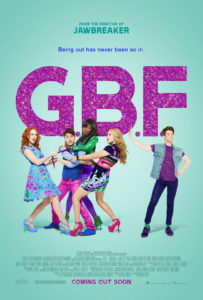Why 'G.B.F.' (2013) is Pretty Good, Actually
This review contains mild spoilers.
G.B.F. is a 2013 feature film written by George Northy and directed by Darren Stein (Jawbreaker). G.B.F., which stands for “gay best friend”, tells the story of Tanner Daniels (Michael J. Willett), a closeted high school student who is “more than content to fly under the radar and leave the trailblazing to the others”. Tanner and his best friend Brent (who is also gay, played by Paul Iacono) struggle to gather the courage to come out to their parents and peers as the ‘hottest new trend’ reaches the radar of the popular crowd: the gay best friend. The film is rated R, though this should not dissuade teens from seeing this particular gay-themed comedy—a sort of Mean Girls for a new generation with an evolved social landscape.

The “gay best friend”, an age-old trope, has been done in countless films and television series. Ranging from one-note (Sex and the City’s Stanford and Mario) to nuanced (Unbreakable Kimmy Schmidt‘s Tituss), the gay best friend exists to support and advise the main protagonist, with their conflicts swept to the side. G.B.F. recognizes and disassembles this tired archetype by leading the narrative with two gay characters caught in the riptide of social comfort with queerness, somewhere between homophobia and fetishization (it is stated in the opening moments of the film that no one at this high school has ever come out of the closet).
With hopes of winning the title of Prom Queen, the school’s three most popular girls, blonde bombshell Fawcett (Sasha Pieterse), drama queen Caprice (Xosha Roquemore), and “Mormon princess” ‘Shley (Andrea Bowen), each scheme to collect a gay best friend to improve their social status. These straight girls claim to want to “help” those who are closeted but very distinctly only care about themselves and their social statuses. After Tanner is accidentally outed, each of the girls jumps at the chance to befriend him.

Tanner and Brent’s navigations of their sexualities drive the story as the heterosexuals occupy the space of the supporting characters. The film examines those who, either purposely or inadvertently, view homosexuals as nothing more than accessories, like a trendy new handbag. This commodification of homosexuals is a concept not unheard of, but rarely has film dove into the issue with such assertive awareness. Moreover, the film insists that every gay person’s experience is different and that there are various natures of gay men other than the fashion-forward, voguish “sissy” archetype (a concept lost on many heterosexuals). G.B.F. makes fun of those that do not get it: the idea that homosexuals are people who do not exist to give fashion advice or assist with relationship problems.
Trapped up against a wall, Tanner reluctantly accepts the friendships of each of the popular girls, Fawcett, Caprice, and ‘Shley. The girls fight over Tanner and claim him on different days of the week like a shiny new toy. In Mean Girls fashion, Tanner learns to enjoy popularity and bask in the monetizing of his newly explored sexuality. Along the way, Tanner discovers layers in each of these girls, realizing they are more than their labels and frivolousness, as the girls learn their own lesson about respecting one’s individuality.

Perhaps it is best that G.B.F. was a relatively small production with a lesser-known writer and director. Devoid of a massive budget and excessive visual style, G.B.F. comes off as sincere rather than expensive. Ryan Murphy’s The Prom film (which has a similar storyline as the latter half of G.B.F.) not only lacked self-awareness, it pretended to have it. Meryl Streep’s “Dee Dee Allen” and James Corden’s “Barry Glickman” are theatre narcissists who do not realize how selfish they are. The idea was that after a couple of expertly manipulative monologues and “yas queen” diva moments, these self-centered characters discover the error of their ways, and the audience learns a lesson. But Ryan Murphy’s direction (mixed with the nausea-inducing colors and cinematography) relished in the exuberant vanity of these characters so much that you forget this was supposed to be a human story. Something like The Prom, a big-budget LGBT film that should feel progressive, is so mechanically engineered and self-indulgent that a moral seems like it’s left on the back burner. Much like its own lead characters, Ryan Murphy’s The Prom is remarkably aware of its star quality and how much of a difference it could make, and not much else.
G.B.F. has no such self-congratulatory quality—the screenplay clearly knows what it wants to say and says it. Without Oscar-winning stars or gaudy set pieces, G.B.F. criticizes the still-relevant dehumanization that heterosexuals often perform on to queer people. Perhaps to overcompensate denial of homophobia, well-meaning heterosexuals diminish potentially meaningful friendships with queer people to a one-way street of fetishization.

Several jokes in G.B.F. don’t land, and terminologies range from satirical to obnoxious (though perhaps the language isn’t so much ‘obnoxious’ as it is ‘young’). The film falls prey to the teen film cliché of involving actors that were visibly well in their twenties, if not pushing 30. The movie’s most prominent stars Megan Mullally (Will and Grace) and Natasha Lyonne (Orange is the New Black), are criminally underutilized, but each of the actors do quite well with this imperfect screenplay.
Many have accused this film of “pretending to be woke”, but I hardly think G.B.F. takes itself seriously enough to be pretentious. I would suggest G.B.F. takes itself seriously enough to coherently execute its thesis, though I would agree that it did not exactly have its finger on the pulse. The film takes many of its story beats from flicks like Mean Girls and Clueless, and the plot loses steam of its principles in its middle third. However, G.B.F. is explicit about queerness and the treatment of queer people with volume that major studio production companies, even eight years later, are still unwilling to channel. As a former closeted teen, I would have loved having access to such a gay comedy that makes light of how straight people treat their gay peers. Does G.B.F. do this flawlessly? No, but it does it confidently.
In such a formative atmosphere as high school, it would be easy for any queer teens to feel the need to give in to such objectification and superficiality that high school offers. G.B.F. concludes that the label of a “gay best friend” is belittling and pressures gay teens into dishonestly conforming to stereotypes to indulge heterosexuals instead of expressing their true selves. The lesson to be learned is one that has been in countless children’s films and series but is now told directly to queer kids: Nobody should have to change themselves to win the approval of their friends and peers. G.B.F. articulates a valuable lesson that must be taught repeatedly, as new generations will continue to possess varied forms of self-consciousness and social hierarchies.

G.B.F. is available to stream for free with ads on YouTube and IMDB TV, and available to rent on Amazon Prime.
See more articles about diversity and diverse issues in film at articles.incluvie.com
More to explore
By Same Author
Related lists created by the same author
By Cluvie Type
Related diversity category
Luz de 'Cuatro Lunas'
By depicting 4 different stories, Director Sergio Tovar Velarde keeps the focus on the shared humanity and search for love (both self and romantic) of various gay Mexican men.
By General Category
Related Movie / TV / List / Topic
James Cameron’s Aliens: A Classic Tale, Brimming With Female Empowerment and Social Resonance
James Cameron’s “Aliens” (1986) is a pinnacle of science fiction storytelling. Within this classic monster movie lies a powerful female character, Ellen Ripley (brilliantly portrayed by Sigourney Weaver).





